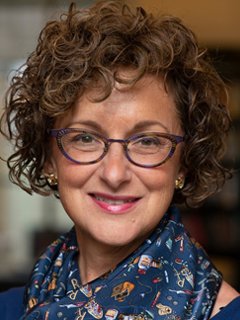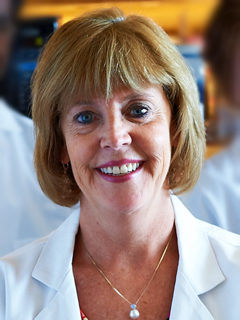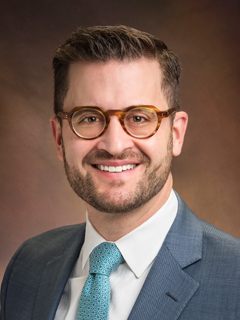HOW CAN WE HELP YOU? Call 1-800-TRY-CHOP
In This Section
PKIDS, Huntington’s Disease, Climate Change, Virtual Driving Assessments

Cruise with us through this week's Children's Hospital of Philadelphia news roundup as we highlight virtual driving assessment milestones and the Philadelphia Regional Center for Children's Environmental Heath (PRCCEH) new focus on climate change. Also featured is a $1 million grant to advance research in Huntington's disease, a new computational tool to track mitochondria transfer in cells, and a Presidential Leadership Award from the Societies for Pediatric Urology.
CHOP-led Research Team Selected for $1 Million Transformative Research Award
The Hereditary Disease Foundation (HDF) awarded Beverly Davidson, PhD, and her collaborative team of scientists with its inaugural Transformative Research Award. Dr. Davidson is one of two recipients of a $1 million grant — the largest ever awarded by the HDF — to advance research in developing treatments for Huntington's disease (HD), an inherited, neurodegenerative disease causing irreversible decline in control of mood, memory, and movement.
The research team, including Leslie Thompson, PhD, from University of California, and Jang-Ho John Cha, MD, PhD, from Latus Bio Inc., is using an adeno-associated virus that can be injected into the brain at very small volumes and widely infect cells of the brain. This method improves on current treatment approaches that require multiple injections at larger volumes and infect fewer cells.
The investigators are targeting two proteins: PIAS1and MSH3, which is involved in a biological phenomenon called "somatic instability" that causes the disease to expand to vulnerable tissues. The team hopes to understand the synergistic effect of targeting both proteins at the same time. If successful, this approach would be a "one-and-done" treatment for HD and will directly lead to clinical trials.
The Transformative Research Award is designed to move the most innovative work in HD from concept to practice by funding collaborative research teams who are focused on creating new ways to move toward a disease-modifying treatment and provide transformational new insights to the HD research field.
Learn more in this HDF announcement.
CHOP, NJM Partnership Celebrates Virtual Driving Milestones
A partnership between CHOP and NJM Insurance Group celebrated two milestones this month: the completion of more than 4,000 virtual driving assessments (VDAs) and the expanded accessibility of the VDA, which is now available at 26 CHOP Primary Care Network offices throughout Pennsylvania and New Jersey. Their collaboration focused on the ways in which the VDA could better prepare adolescents for navigating the roads once they obtained their licenses.
"This partnership was the first-of-its-kind, and its success has provided thousands of novice drivers with an engaging and interactive way to prepare them to be safer drivers when they get their licenses," said Flaura Winston, MD, PhD, founder and co-scientific director of the Center for Injury Research and Prevention.
With support of a $4 million grant from NJM, CHOP expanded its use of the VDA — which employs a platform developed by Diagnostic Driving Inc. called Ready-Assess™, an AI-driven virtual driving assessment that provides the driver with the insights and tools to improve — to become an optional part of most primary care visits.
Read this CHOP press release to learn more about these milestones.
Novel Computational Tool Follows Mitochondrial Transfer in Cancer Cells to Gauge Patient Prognosis
For the first time, CHOP researchers have confirmed the unilateral mitochondrial transfer from T cells to cancer cells at single cell genomic levels using an algorithm they developed called Mitochondrial-Enabled Reconstruction of Cellular Interactions, or MERCI. Mitochondria can be transferred or drained from immune cells to cancer cells through miniscule tunnels called nanotubes, and MERCI helped researchers discover a previously unreported cancer phenotype related to this mitochondrial transfer. Cancer Cell published the study findings.
Cancer cells engaged in mitochondrial transfer displayed higher cytoskeleton remodeling activity and elevated gene expressions in the tumor necrosis factor ɑ pathway. MERCI identified 17 genes implicated in nanotube formation and mitochondrial transfer and created a gene set enrichment score — called a tumor MT transfer (TMT) score — based on the mRNA expression of these 17 genes. The researchers then analyzed a large human patient cohort using TMT scores and found higher TMT scores correlated with poorer patient outcomes.
"MERCI is a powerful tool that could help gauge patient prognosis," said Bo Li, PhD, core faculty member in the Center for Computational and Genomic Medicine at CHOP. "Future research should seek to identify which genes and pathways are most involved in this process, so that we can use this data to develop targeted treatments."
Learn more at CHOP News.
PRCCEH Adds Climate Change as Fifth Area of Focus
The Philadelphia Regional Center for Children's Environmental Heath (PRCCEH) will expand its research focus to include climate change, with support from a National Institute of Environmental Health Sciences administrative supplement.
The one-year grant, which is more than $300,000, will not only allow PRCCEH to study the effects of extreme heat on children's development and mental health but also expand their other four focus areas — lead, air pollution, asthma, and endocrine disrupting chemicals — by examining how they intersect with climate change.
"Climate change disproportionately affects marginalized and disadvantaged children through more excessive heat days, worsening air pollution, which increases asthma and other respiratory conditions," said Rebecca Simmons, MD, co-director of PRCCEH. "Climate change is also expected to raise yearly pollen counts and prolong the allergy season. More flooding events, like we've seen this year, leads to more mold in homes, which is a common asthma trigger. This grant will help us to work toward mitigating these impacts on the most vulnerable population, our children."
By investigating the role of ambient temperature, heat index, and air pollution on birth outcomes and placental health, PRCCEH hopes to enhance the capacity of early-stage investigators and trainees in climate change research and its translation to children's health. They also plan to facilitate workshops and translational programs for community groups.
The Center was founded in December 2021 at the University of Pennsylvania and Children's Hospital of Philadelphia, and its membership includes researchers from regional institutions and universities.
See PRCCEH's announcement for more information.
CHOP Researcher Honored by Societies for Pediatric Urology for Kidney Stone Study
The Societies for Pediatric Urology (SPU) selected Attending Urologist Gregory Tasian, MD, MSCE, to receive the 2023 Presidential Leadership Award for his work on creating the Pediatric KIDney Stone (PKIDS) Care Improvement Network.
"I am incredibly grateful for the patients, urologists, coordinators, and members of the PKIDS data coordinating center at CHOP whose commitment to improving the health of children with kidney stones made this collective achievement possible," Dr. Tasian said. "These partnerships are the cornerstone of PKIDS. We are looking forward to applying the knowledge that PKIDS has generated back into real-world care to improve outcomes for our patients."
As kidney stones become one of the fastest growing health conditions among children, teens, and young adults, this study will offer a clinical care guide for the three treatment options available: ureteroscopy (an endoscopic outpatient procedure), shockwave lithotripsy (a noninvasive outpatient procedure), or percutaneous nephrolithotomy (a minimally invasive surgery with a short hospital stay). The PKIDS Care Improvement Network will compare stone clearance and patients' experiences from each of these treatments to allow patients and their families to make more individualized decisions when choosing surgical treatment options for kidney stone removal.
The Presidential Leadership Award and Presidential Citations were developed to recognize younger pediatric urologists who have risen to the leadership level and have performed "above and beyond" in the service of pediatric urology. The Leadership Award is supported by an endowment from Patrick and Linda McKenna.
See SPU's award announcement to learn more.
ICYMI
Catch up on our headlines from our Sept. 29 In the News:
- 'Evidence to Action' Brief Spotlights Vaccination Policies for Higher Education Students
- New Genetic Disease Linked to Variants in Iron-Encoding Genes
- CHOP Researchers Characterize More Than 100 Genes Associated With Leigh Syndrome Spectrum
- Post-Injury Outcomes Worse for Athletes Experiencing Concussion Outside of Sports
- Novel Method Developed Using MRI to Study Diseases Modeled in Zebrafish
Keep up with our news, stories, and updates in real time by following us on Twitter, LinkedIn, or Instagram. Meet the minds behind the science in the Bench to Bedside podcast. Or subscribe to our newsletter to receive an email every other Friday by signing up here.







